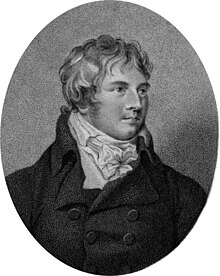Johann Ladislaus Dussek
| Born | 12 February 1760 |
|---|---|
| Died | 20 March 1812 (aged 52) |
| Era | Classical |
| Spouse | Sophia Dussek (m. 1792) |
| Children | Olivia Buckley |
Jan Ladislav Dussek (baptized Jan Václav Dusík, with surname also written as Duschek or Düssek; 12 February 1760 – 20 March 1812) was a Czech classical composer and virtuoso pianist. He was an important representative of Czech music abroad in the second half of the 18th century and the beginning of the 19th century. Some of his more forward-looking piano works have traits often associated with Romanticism.
See More :

The Czech composer and pianist Johann Ladislaus Dussek (1760-1812) occupies an interesting place in the history of piano music. His singing style and colourful sonorities is sometimes described as foreshadowing the Romantic period – however, he was completely out of fashion by the time Chopin, Schumann or Mendelssohn entered the scene. Nevertheless he did play a crucial role by encouraging piano makers, among them John Broadwood, to extend the 5-octave compass of the fortepiano and to strive for a more robust tone. His works include more than forty piano sonatas and numerous other keyboard pieces, eighteen piano concertos, nearly ninety accompanied sonatas, other chamber and vocal music, as well as the pedagogical work Instructions on the Art of Playing the Piano Forte or Harpsichord (1796). Dussek received his early training as a choirboy at a Jesuit school, and after giving up his intention of becoming a monk, went to Prague for further music study. During the early 1780s he travelled Europe as a piano virtuoso, composer and pedagogue. He is reported to have appeared at the court of the Czar in St. Petersburg, and to have spent some time studying with C. P. E. Bach in Hamburg. In 1786 Dussek settled in Paris, but had to flee during the Revolution, because of his connections with the aristocracy – his playing had found favour with Marie Antoinette. Arriving in London, he gained popularity as a performer, appearing frequently with the brilliant violinist Salomon, occasionally with Haydn, and also with the singer, pianist and harpist Sophia Corri who was to become his wife. He entered into a publishing venture with his father-in-law but the business failed in 1799; Dussek left his family and fled the country to escape debt. He then entered the service of Prince Louis Ferdinand of Prussia; Dussek´s colleague Louis Spohr reported on the wild and reckless life they led together as they travelled with the prince from one battlefield to another. The death of Louis Ferdinand inspired Dussek’s famous piano sonata Élégie harmonique. In his youth Dussek had been admired for his handsome appearance – he is said to have been the first pianist to play with his profile to the audience, “so that the ladies could admire his handsome profile” (Spohr) – but later in life he became extremely obese, drank too much and spent much of his time in bed. Dussek died of gout; his burial place is not known.
Quote:
Haydn (letter to Dussek’s father):
“I … consider myself fortunate in being able to assure you that you have one of the most upright, moral, and, in music, most eminent of men for a son. I love him just as you do, for he fully deserves it. Give him, then, daily a father’s blessing, and thus will he be ever fortunate, which I heartily wish him to be, for his remarkable talents.”
All pieces: |
||||
|---|---|---|---|---|
| Gavotte | F Major | – | 2 | |
| Minuet | G Major | – | 3 | |
| Sonatina Op. 20 No. 4 | A Major | – | 4 | |
Copy by : pianosintheparks.com



Leave a Reply
Want to join the discussion?Feel free to contribute!